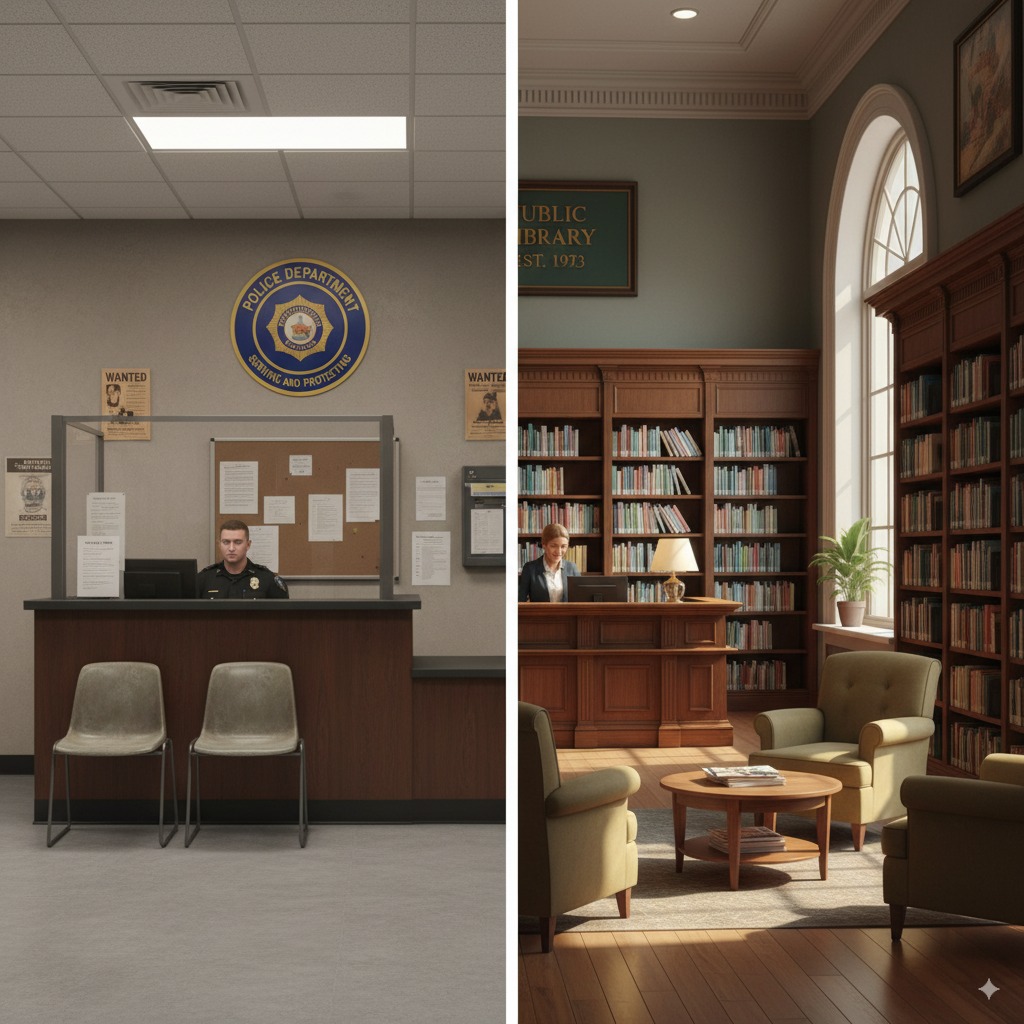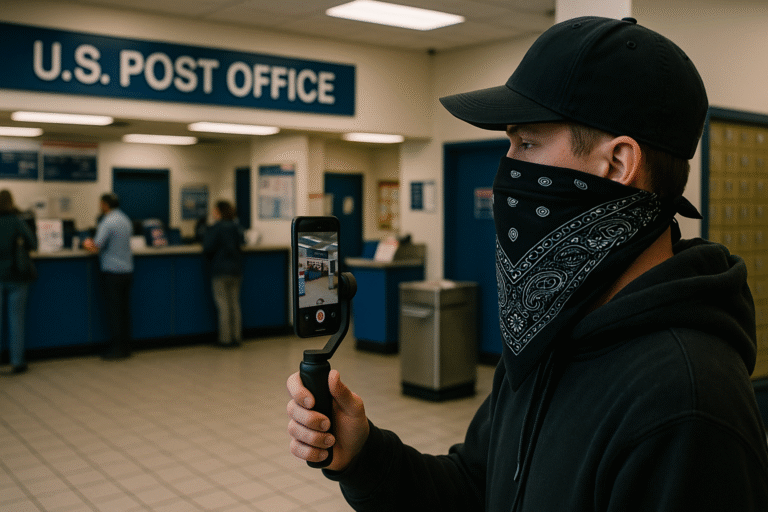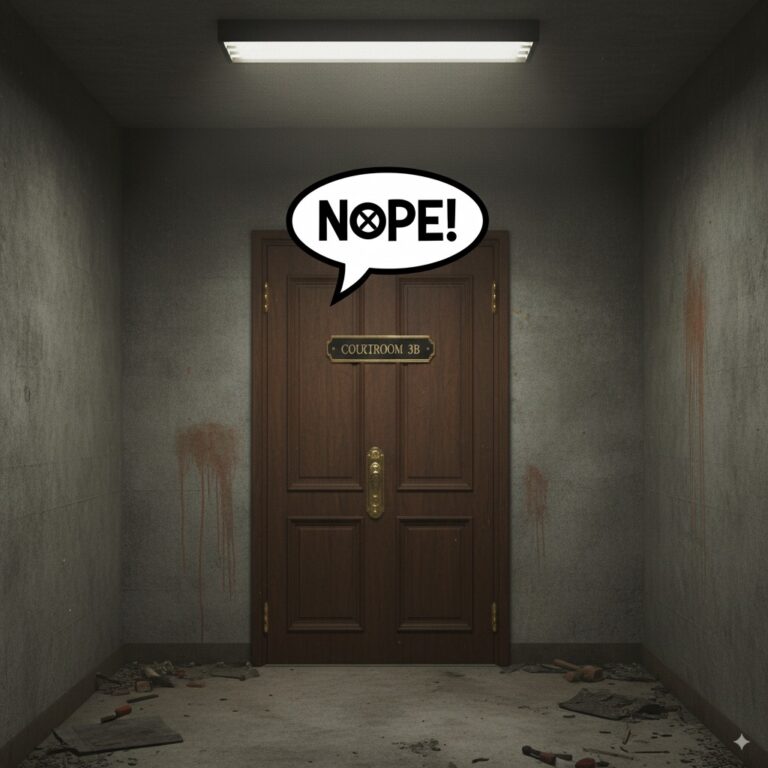Spotlight on Venues: Police Stations vs. Libraries
Public Access & Entry Rules: Police stations and public libraries differ in what areas are open to the public and how those spaces are managed. Police precincts often have a publicly accessible lobby for walk-up services, but most inner offices and detention areas are strictly off-limits. Signage or department policy may forbid photography in these “Department facilities,” leading officers to tell people to stop filming or even arrest them for trespass[1][2]. For example, the NYPD Patrol Guide explicitly bans recording police activity inside precincts, and calls officers to enforce it—even in publicly accessible lobbies[1]. By contrast, libraries are generally fully open to patrons during open hours, with only clearly marked staff-only or study rooms restricted.
Police department public lobbies are often accessible for filings and questions, but not all areas of a precinct are open to cameras[1].
Filming Permissions & Legal Framework: In general, courts recognize a First Amendment right to record public officials in public spaces[3]. The Seventh Circuit (covering Illinois) held that audio and video recording of public employees in a public place – such as a police lobby or library – is protected speech[3]. This means an auditor filming inside a public lobby or library (without disrupting others) is exercising constitutionally protected activity. However, libraries and courts treat libraries as “limited public forums”: spaces open to the public for a purpose (receiving information) rather than full free-speech zones[4][5]. Libraries may therefore impose reasonable, content-neutral rules on activities not tied to their mission (e.g. photography, petitioning, etc.). By contrast, recording police performing duties has been repeatedly recognized as protected speech across most federal circuits, subject only to reasonable time/place restrictions[3][6].
In public spaces like a library reading room or police station lobby, bystanders may film under most circumstances[3][4].
Privacy & Restricted Areas: Auditors must also be mindful of privacy expectations. Libraries emphasize patron privacy: shooting identifiable images of other readers or filming private areas (restrooms, small study rooms) is generally prohibited[7][8]. For example, New Jersey library guidelines warn that filming patrons conflicts with their right to seek information privately[7]. Likewise, police departments cite privacy interests of crime victims, witnesses, or suspects who come through a station. The NYPD argues that recording in precincts can “undermine the privacy of people who interact with the criminal justice system”[1]. Auditors should note that while filming public officials is protected, repeatedly zooming in on private conversations or confidential documents (in either venue) can lead to trouble. Good practice is to stay in open areas, avoid filming without consent in user-designated quiet or private zones (in a library), and always comply with lawful orders if areas are blocked off or marked “staff only.”
Staff and Law Enforcement Responses: How employees or officers react can greatly affect an audit. Police often respond to camera users by invoking department policy or trespass law. In some cities, officers immediately instruct auditors to stop filming and to leave the lobby[1][2]. In other cases, officers have overreacted: for instance, four Danbury, CT, officers were later disciplined (some suspended) after dragging an auditor out of the public library[9]. Department bulletins now often remind officers not to engage or provoke auditors unless conduct truly disrupts business[9][10]. Library staff are usually advised to remain calm and professional. Guidance for librarians stresses speaking in a “calm, even and relaxed” tone, not debating legal rights, and focusing only on disruptions to other patrons[10]. In practice, most library workers are told to “be as boring as possible” – politely stating that filming in public areas is allowed, then returning to their duties[10]. If an auditor’s behavior violates harassment or privacy policies, staff may call security or police, but they are cautioned against treating filming itself as a violation[10][11]. In short, aggressive or confrontational responses often backfire (as the Danbury example shows[9]), while measured compliance tends to end the audit quietly.
State-level Variations: First Amendment audit rules can vary by state law, court decisions, or local ordinances:
- New York: In 2019, New York enacted the “Right to Monitor” Act expressly protecting individuals recording police, and New York City followed in 2022 with a Right to Record Act that affirms no-city-precinct exception[12]. The NYC law explicitly allows anyone to film officers “acting in their official capacity,” and police precincts are not excluded[12]. Despite an NYPD rule banning filming inside stations, the city council declared such an absolute ban invalid by law[12][1]. (Note: Second Circuit courts have not squarely ruled on this right, but the statutes clearly favor auditors in NY.)
- Pennsylvania: A 2020 Pennsylvania state appellate case (Commonwealth v. Bradley) upheld a police department’s no-filming rule in its lobby as a valid “time, place, and manner” restriction protecting privacy[2]. The court found the ban content-neutral and narrowly tailored to protect confidential investigations and victims’ identities[2]. This shows one state court sanctioning lobby recording bans for security reasons.
- Illinois (7th Circuit): The U.S. Court of Appeals for the Seventh Circuit (covering Illinois, Wisconsin, Indiana) has strongly protected recording public officials. In ACLU v. Alvarez, the court struck down Illinois’s eavesdropping statute for capturing on-duty officers in public[3]. By extension, Illinois agencies must allow filming in public areas of stations and libraries, subject only to standard, viewpoint-neutral rules. Many Illinois library guides cite this precedent to assure staff that filming alone is legal[3].
- Indiana: In 2023 Indiana passed a law making it a crime to approach within 25 feet of a police officer after being ordered to stop. Critics (including the ACLU) say this effectively lets officers shut down filming at will. A federal suit is challenging the law as violating the right to record on public streets[13]. As written, it would be the first state law explicitly giving officers power to disperse lawful video recorders.
- Arizona: Arizona’s legislature attempted a ban on recording police within 8 feet (HB 2319). In September 2022 a federal court enjoined the law as unconstitutional[14]. The judge blocked enforcement, recognizing that citizens have a right to film officers during official duties.
Other states also differ. For example, Florida’s stringent all-party consent wiretap laws mean an auditor must be careful about recording private conversations in a library (even if videotaping is allowed). Meanwhile, various local agencies nationwide have adopted signage or policies marking “no recording” zones, but many of those policies are legally questionable if enforced.
Case Studies: Real-world incidents highlight these contrasts. In Danbury, CT, YouTuber SeanPaul Reyes (aka “Long Island Audit”) filmed inside the Danbury public library. Four officers were later disciplined for forcibly removing him; a police chief memo even linked the case when reminding officers that recording in public is lawful[9]. In New York City, Reyes was similarly arrested for filming in a precinct lobby, prompting him to sue the NYPD for violating state law[1][12]. In Massachusetts, a recent audit inside a Lexington public library went viral after a filming auditor’s tripod sparked a scuffle with another patron and required police intervention[15]. In each example, the venue shaped the outcome: library staff defended patrons’ privacy, police deferred to policy, and ultimately courts were drawn in to sort out rights versus rules.
Overall, auditing at police stations tends to raise sharp conflicts over precinct rules and privacy; libraries often focus debates on patron privacy and staff training. Auditors should study local policies and state laws: ask whether filming is expressly forbidden (as in some precincts) and remember that even in public spaces like a lobby or reading room, reasonable limits (time, place, manner) may apply. Staying calm, knowing the law, and choosing public common areas for filming are best practices. In either setting, the First Amendment protects a videographer’s presence and camera – but respect for legitimate privacy zones and security concerns will make any audit go more smoothly[3][11].
Sources: Analysis is based on recent legal developments, library association guidance, and reported incidents[1][3][2][7][11][13][14][9][15]. Each venue’s policies are colored by these cases and guidelines.
[1] ‘First Amendment Auditor’ Sues NYPD Over Right To Record in Police Stations
[2] [6] [12] Recording in police department lobbies is unsettled law
[3] [7] [10] Prepare for First Amendment Auditors
https://www.clicweb.org/wp-content/uploads/2023/04/Quick-Guide-to-First-Amendment-Audits.pdf
[4] [5] [8] Auditing the First Amendment at Your Public Library – Intellectual Freedom Blog
[9] First Amendment ‘audit’ leads to suspension of Conn. officer
[11] in.gov
https://www.in.gov/library/files/Lega-Memo-first-amendmt-audit.pdf
[13] New Indiana Law Undermines Police Accountability and First Amendment | ACLU of Indiana
https://www.aclu-in.org/en/news/new-indiana-law-undermines-police-accountability-and-first-amendment
[14] Federal Court Blocks Unconstitutional Police Recording Bill – ACLU of Arizona Reacts | ACLU of Arizona | The American Civil Liberties Union of Arizona is the state’s premier guardian of liberty, working daily in the courts, Arizona Legislature, and communities statewide to defend and preserve individual rights and freedoms guaranteed to all by the Constitution.
[15] YouTubers film, insult public workers in towns across Mass. for self-declared ‘First Amendment audits’



